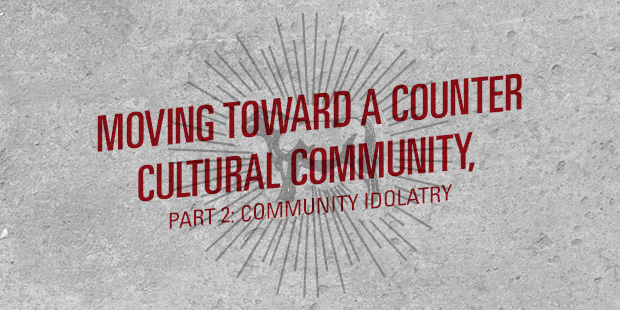
Moving Toward a Counter-Cultural Community, Part 2: Community Idolatry
In the first post, I talked about 11 different aspects of society used a filters or barriers to form or foster community. I argued, “In order for a gospel community to be counter-cultural, we first have to assess what we are encountering in the culture. How does culture and society determine how community is formed and fostered? What are some of the guiding principles and motivations behind its formation?” If part one addresses the external schema of society formation, this post addresses the internal driving forces influencing how and where we fall out in our version of societal segregation.
Dick Keyes, in his chapter “The Idol Factory” (in No God but God) takes about the construction of idols in our lives. He makes the distinction between “near” and “far” idols. Near idols are those that are more specific, superficial and concrete, such as career, spouse, possessions, etc. Far idols, on the other hand, are “farther” from the surface of things and go to the root of why we do what we do. They get to the “sin beneath the sin” and are also referred to as “source” or “root” idols.
Far idols get to our motivational drives and function as basic controlling principles that, unless confronted and challenged by the gospel, will manifest in many outward forms. The four basic “source” idols are power, comfort, approval, and control (there are others, but I will refer to these main four in this post). Here’s what they say:
Power idolatry says: “Life only has meaning /I only have worth if‐‐I have power and influence over others.
Approval idolatry says: “Life only has meaning /I only have worth if‐‐I am loved and respected by _______________
Comfort idolatry says: “Life only has meaning /I only have worth if‐‐I have this kind of pleasure experience, a particular quality of life.”
Control idolatry says: “Life only has meaning /I only have worth if‐‐I am able to get mastery over my life in the area of ___________________.”
John Calvin says the human heart is a factory of idols. Tim Keller argues that idolatry is always the reason we do anything wrong. Paul Tripp agrees, saying that sin is fundamentally idolatrous. So what is the connection, then, with source idolatry and being a counter-cultural community?
Idolatry-Centered Community
Because idolatry is the sin beneath the sin, the motivational fruit for the behavioral fruit of our choices, it stands to reason that a counter-cultural community will come to terms with the idolatry-centered nature of secular society. The societal segregation I explained in part one is fueled by the idolatrous desires of sinful people–a people seeking that ideal community who not only accept but also appreciate one’s idolatry. If at any point idolatrous cravings are not satisfied by a compliant community, there will be a reconstitution of that community in rejection to their nonconformity.
The five components of idolatry-centered community are: (1) self-serving, (2) comfort-securing, (3) pride-protecting, (4) approval-demanding, and (5) control-promoting. In every expression of community building outside of Christ, these components of source idolatry will shape and govern the community dynamic. It is precisely at these points the idolatry-centered community must be challenged by the gospel (more on that later).
Whether we do it consciously or unconsciously, we look to have relationships that feed our community idolatry. Why do we filter people out and create barriers to keep others out? Is it not because we are self-serving and comfort-securing? Why do we build a community of people most like us? Is it not because we are approval-demanding and control-promoting?
These “far” idols are also connected to our “near” idols–the more specific, concrete manifestations of idolatry. We are “driven” by the near idols of time (manifested in busyness), money (manifested in consumerism), and space (manifested in individualism), and the root case of these can be unearthed by detecting their relationship to the source idols of comfort, power, approval, and control.
When people say they do not have time for meaningful relationships due to their busy schedule, they have made an idol out of time (squeezing everyone out but themselves). When people treat others are commodities (goods and services) in a consumeristic fashion, they have made an idol out of money. When people intentionally keep others out and demand autonomous living, they have made an idol out of space. All of these “near idols” are driving forces behind the societal segregation (just like “far idols”).
At the heart of the idolatry-centered community is the attempt of enjoying the “ideal” community apart from the gospel of Jesus Christ. In this broken world where the most fundamental and necessary relationship (with God) is rejected, community becomes a functional savior and “god-replacement” in ways it was never intended. Therefore, the irony of idolatry-centered community is that it can never deliver on the idolator’s idealized dream of community.
In part 3, I will provide an excerpt from Dietrich Bonhoeffer’s Life Together in which he argues the Christianized attempt of idealizing (idolizing) community apart from Jesus actually destroys community.
Read Part 1 here.
Read more from Timmy here.

Tags: Community, Duplication, Timmy Brister











